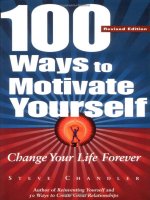Feeling good 100 ways to feel better every day phần 2 ppsx
Bạn đang xem bản rút gọn của tài liệu. Xem và tải ngay bản đầy đủ của tài liệu tại đây (128.09 KB, 14 trang )
Accept responsibility for your health.
If you take responsibility for your health and choose
to live a healthy lifestyle, you increase your chances of
living to a ripe old age.
• Have regular medical checkups. Have an annual flu
shot, a pneumonia shot if you are over 65, and other
immunizations recommended by your doctor.
• Participate in workplace blood pressure and
cholesterol screenings, and get the routine preventive
care tests recommended by your doctor, including a
mammogram, prostate cancer screening test, pap test,
colonoscopy, and other important exams.
• Quit smoking and limit how much alcohol you drink.
• Stay active physically and mentally.
14
Find a doctor you like and trust.
Research shows that patients who have a good
relationship with their doctor feel better about
their health.
• Don’t wait until you are sick to find a doctor. A
doctor who is familiar with you and your medical
history is more likely to be able to help you get the
best possible care.
• Look for a board-certified doctor who is well trained
and experienced and whose approach you trust—
someone who is a good listener and who takes your
concerns seriously. Choose a doctor whose location
and hours you find convenient.
• Seek care consistently from one physician or
physicians’ group. This helps prevent potentially
interfering medications from being prescribed by
different doctors.
15
Make someone else feel good.
Doing for others makes you feel good. It may also be
good for your physical health. A recent University of
Michigan study found that people who give support
and assistance to others live longer.
• Help a friend, relative, or neighbor with errands,
transportation, shopping, babysitting, or other tasks.
• Get involved in a volunteer organization.
• Teach your child how good it feels to give to others
by volunteering together at a local soup kitchen or
helping out an elderly neighbor.
• Pick up trash when you see it in a park or on
the beach.
• Let someone else take the good parking space or go
ahead of you in line.
16
17
Go away.
A weekend away is a great way to reduce stress,
improve your mood, and feel good. It’s a way to
focus on one thing only: relaxation. When you go
away, don’t take your work with you. Turn off your
cell phone (except for emergencies). And leave
your computer and worries behind so you can
concentrate on friends, family, and yourself. You’ll
return feeling renewed.
“Once a year, go some place you’ve never been before.”
–Dalai Lama
We spend most of our lives indoors. But being
outdoors has many health benefits, from breathing
fresh air to taking in the sun. A little sunshine feels
great, can help lift feelings of depression, and is a
great source of Vitamin D, so long as you protect
yourself with sunscreen. Being outdoors in good
weather also encourages physical activity. Try to spend
time outdoors as often as you can.
• Read a book or newspaper outdoors on your lunch
break. Or take a walk.
• Do gardening. It’s rewarding, good therapy, and a
great workout.
• Go camping, hiking, or take nature walks with friends
and family.
18
Spend time with your pet.
Owning a pet is good for your physical and mental
health. Many studies have shown that spending time
with your pet eases feelings of stress, loneliness, and
depression. It may even lower blood pressure. Try to
spend some time with your pet every day. After a long
day at work, playing with your pet is a great way to
unwind and reduce stress.
If your circumstances don’t allow you to own a pet,
offer to walk a friend’s pet.
19
Take your daily multivitamin.
The Journal of the American Medical Association now
encourages all adults to take a daily multivitamin.
Multivitamins may help prevent a number of chronic
diseases, including some cancers, osteoporosis, and
heart disease. When you buy multivitamins, always
check the expiration date. Check for the letters “USP”
on the label. This mark tells you that the U.S.
Pharmacopeia has declared that the vitamin actually
contains the ingredients and the amounts stated on
the label and that the tablets will dissolve effectively.
For the best absorption, take your multivitamin with
a meal. Talk to your doctor about vitamins and
calcium supplements.
20
Get the calcium you need.
Calcium is essential to a healthy diet and it helps
prevent osteoporosis in later life. But most of us
don’t get the calcium we need.
• Beginning at age 9, children should get 1,300 milli-
grams of calcium per day in their diet. Serve your
child low-fat milk and foods high in calcium such as
yogurt, cheese and other dairy products, cereal with
calcium, orange juice with calcium, and dark-green
leafy vegetables. An 8-ounce glass of low-fat milk has
300 milligrams of calcium.
• Most adults up to age 50 need 1,000 milligrams a day
of calcium. Pregnant women and people over 50 need
more than that.
Half of all children under age 5, 35 percent of teenage
boys, and about 85 percent of teenage girls do not
consume the daily calcium recommended by experts.
21
Be a healthy traveler.
It’s especially important to take care of yourself when
you’re away from home and familiar routines.
• Drink plenty of water and carry a bottle of water with
you wherever you go. Remember to drink water when
you fly because air cabins are very dry. Drink an 8-
ounce glass of water before, during, and after your
flight so you stay hydrated.
• Eat healthy meals and don’t skip breakfast.
• Pack healthy snacks in your carry-on bag for the plane
or train trip.
• Get regular exercise when you are away from home.
• Schedule a time to relax every day to unwind and
relieve stress. You might meditate, get a massage,
watch a movie, or read a good book.
22
Get in the sleep mood.
Most of us average 6 hours 54 minutes of sleep a
night—about an hour less than the 8 hours that many
experts recommend. Too little sleep can affect your
mood, your work, and how you feel. If you have trouble
falling asleep or staying asleep at night, or if you’re
sleepy during the day, you may be sleep deprived.
To improve your sleep, get in the sleep mood. Help
your body make the shift from busy-awake time to
sleep-time by establishing a “wind-down” hour before
bed. During this time, don’t work, pay bills, exercise,
or watch disturbing shows on TV. Use your wind-
down hour to read and relax and soon you’ll be
nodding off.
Tip: If you have trouble falling asleep after 20-30 minutes,
get out of bed and do something relaxing, such as reading.
Try going back to bed after half an hour. Repeat if necessary.
23
Create a community.
Create a community—a network of relationships—
and you’ll feel better throughout your life. Get to
know the children and adults in your neighborhood.
Meet other parents at your child’s school and get
together once a month or so to talk about parenting.
Organize activities at work that bring people together.
Get involved with your faith community. Offer to
help a co-worker, neighbor, or friend. Donate your
time to a community organization. Become involved
in activities that bring younger and older generations
together. Be the person who brings people together in
your extended family.
24
Laugh.
We’re all drawn to people with a sense of humor.
Humor is a great way to release tension and shake a
bad mood. It can also make the workday more fun—
so long as the humor is appropriate, not offensive to
others, and doesn’t interfere with work.
• Use humor to lighten up a difficult situation.
• Look for opportunities to laugh with co-workers. Start
a joke-of-the-month contest. Clip and post cartoons
that make you laugh.
• Buy a funny card for a co-worker.
• Don’t be afraid to laugh at yourself.
25
26
Know the food Pyramid facts.
The USDA Food Guide Pyramid offers basic
recommendations to help you eat sensible portions
and well-balanced meals. Let the Pyramid guide
you—by choosing whole grains, a variety of fruits
and vegetables, and by limiting sugar and saturated
fat. Some experts advise eating less red meat and
refined grains. The USDA is releasing a revised
Pyramid in 2005.
Fats, Oils, & Sweets
USE SPARINGLY
Milk, Yogurt, &
Cheese Group
2-3 SERVINGS
Vegetable Group
3-5 SERVINGS
Bread, Cereal, Rice,
& Pasta Group
6-11 SERVINGS
Fruit Group
2-4 SERVINGS
Meat, Poultry, Fish,
Dry Beans, Eggs, &
Nuts Group
2-3 SERVINGS









